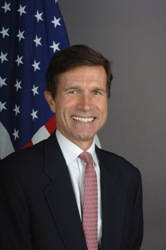 Sri Lanka should cut corruption and create transparent processes for investors and also avoid unpredictable actions such as expropriating property, a senior US State Department official said.
Sri Lanka should cut corruption and create transparent processes for investors and also avoid unpredictable actions such as expropriating property, a senior US State Department official said.
“In general we want to see the government do as much as they can to reduce some of the impediments – bureaucratic impediments – to investments here,” US Assistant Secretary for South Asia Robert Blake told reporters in Colombo.
“To reduce corruption, to do everything they can to provide a transparent open environment in which American and other investments are encouraged.”
US is Sri Lanka’s top buyer of exports, and has also invested in several sectors, mostly before the end of a 30-year war involving Tamil Tiger separatists.
Blake was in Colombo to push for faster implementation of recommendations from a committee appointed by the Sri Lankan state to go into the island’s most recent civil war and recommend measures to reconcile ethnic differences and improve rule of law and justice.
Sri Lankan citizens have taken up arms against the state three times since independence from British rule, the Sinhalese majority twice and the Tamil minority once.
The US is also pushing for improved human rights for Sri Lankan citizens and accountability for alleged abuses in the last stages of the war, and progress on missing persons, Blake said.
Blake was US ambassador to Colombo during the last stages of the war.
Blake said there were opportunities for US businesses in tourism, information technology and infrastructure.
In prepared remarks made to the American Chamber of Commerce in Colombo earlier in the day he said US investors faced an uphill battle in Sri Lanka and there had not been new US firms coming to the island.
“It’s not for lack of trying, but our investors, and investors from many other countries as well, face an uphill battle in Sri Lanka’s marketplace,” he said.
“The barriers include confusing and opaque rules on bidding for contracts, unpredictable government regulations such as the recent so-called Under-utilized Assets bill, and corruption.”
The so-called ‘under-utilized assets bill’ expropriated several local and foreign owned firms despite the existence of constitutional guarantees the promised investors that their property rights would not be violated in the island.
The law which legislators criticized as ‘ad hominem’ or targeting individual entities also blocked room for judicial review, trespassing on the separation of powers between the executive, the legislature and judiciary.
Indian and Chinese investors however have come to Sri Lanka after the war to invest in hotels, buying state and private land.
Sept 14, 2012 (LBO)
